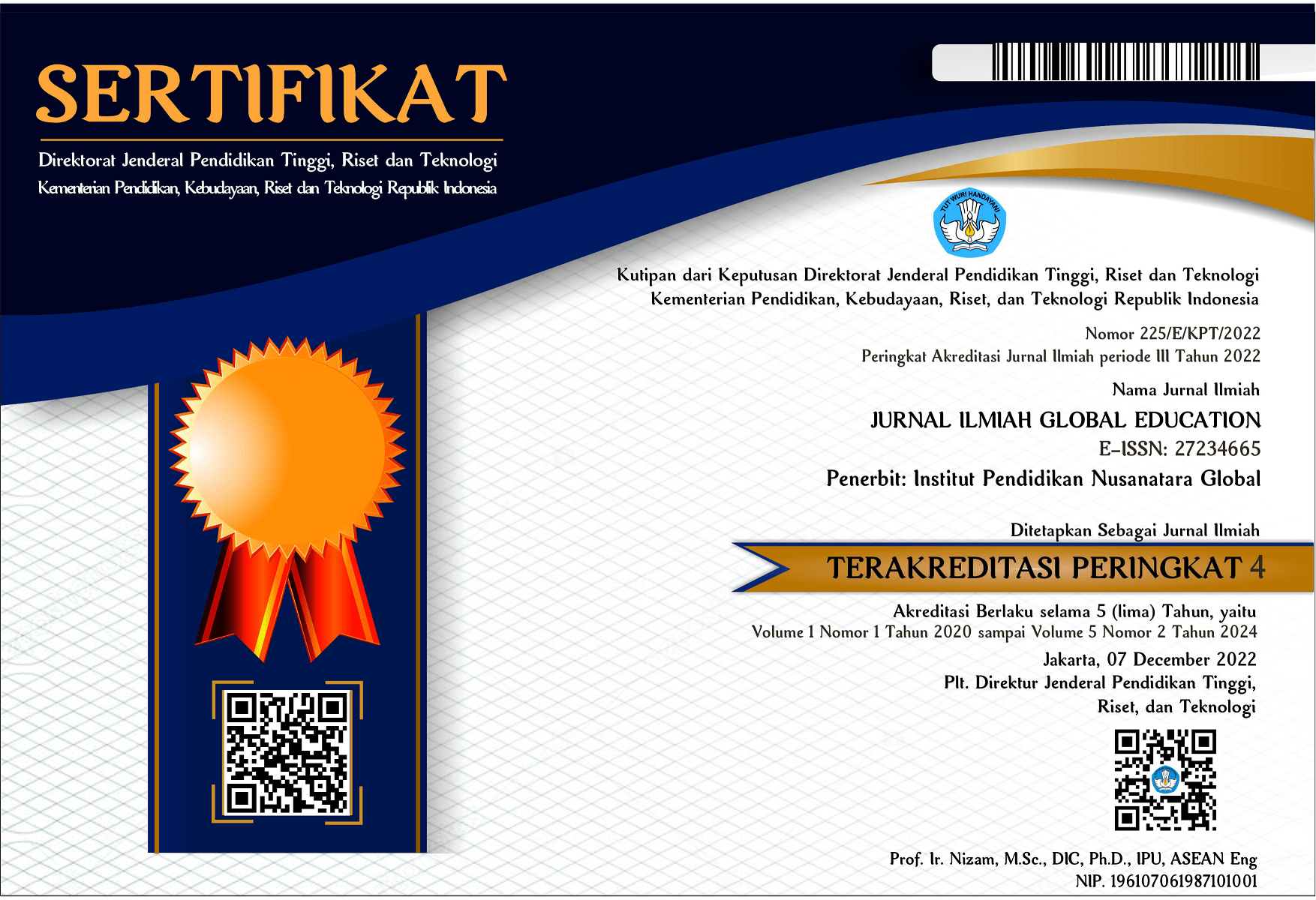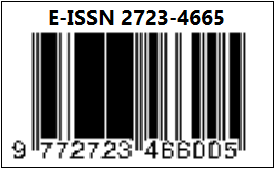IMPLEMENTATION SUSTAINABLE ECOTOURISM CIKOLELET TOURISM VILLAGE
DOI:
https://doi.org/10.55681/jige.v4i1.600Keywords:
Sustainable Ecotourism, Cikolelet tourism village, MOA ModelAbstract
Ecotourism is a sustainable and responsible form of travel that promotes conservation, benefits local communities, and provides travelers with a unique and educational experience in natural environments. Although some tourism researchers have used the MOA model to study factors influencing community participation, there is still a scarcity of literature that can provide sufficient empirical support to prove the MOA model's predictive power for examining community participation in the tourism context. Especially in the context of nature tourism. Seeing this gap, the purpose of this research is to determine the impact of sustainable ecotourism on community participation using the MOA model.. This research was conducted in Cikolelet Tourism Village. There were participants whose information was examined by researchers, namely the head of the Cikolelet Tourism Village Pokdarwis and the Village Head and members of the Pokdarwis. The result show that the prospects to implementing sustainable ecotourism in Cikolelet rural tourism area can develop and promote community participation
Downloads
References
A’inun N, F., Krisnani, H., & Darwis, R. (2015). Pengembangan Desa Wisata Melalui Konsep Community Based Tourism. Prosiding Penelitian Dan Pengabdian Kepada Masyarakat, 2. https://doi.org/10.24198/jppm.v2i3.13581
Ayachi, H., & Jaouadi, S. (2017). Problems and perspective of ecotourism in the Island of Farasan. Society and Business Review, 12(2), 235–251. https://doi.org/10.1108/SBR-10-2016-0056
Batra, R. & R. M. L. (1986). Situational effects of advertising repetition: the moderating influence of motivation, ability, and opportunity to respond. Journal of Consumer Research, 12, 432-449.
Creswell, J. W. (2016). Qualitative Inquiry dan Research Design. University Of Nebraska, Lincoln.
Haldar, P. (2018). Rural Tourism - Challenges and Opportunities.
Hubner, I. B., Pramono, R., Sitorus, N. B., & Lemy, D. M. (2022). Implementation of the Four Pillars of Sustainable Tourism Destinations in the Tourism Village of Kampung Keranggan , South Tangerang. 510–520.
Hung, K. , S.-T. E. , & I. L. J. (2010). Testing the efficacy of an integrative model for community participation. Journal of Travel Research, in press.
Hung, K., Sirakaya-Turk, E., & Ingram, L. J. (2010). Testing the Efficacy of an Integrative Model for Community Participation. Journal of Travel Research, 50(3), 276–288. https://doi.org/10.1177/0047287510362781
Jadesta. (2022). Desa Cikolelet https://jadesta.kemenparekraf.go.id/desa/cikolelet.
Jepson, A. (2012). Investigating the use of the Motivation-Opportunity-Ability (MOA) Model to reveal the factors which facilitate or inhibit inclusive engagement within local community festivals.
Jepson, A., Clarke, A., & Ragsdell, G. (2013). Applying the motivation-opportunity-ability (MOA) model to reveal factors that influence inclusive engagement within local community festivals: The case of Utcazene 2012. International Journal of Event and Festival Management, 4(3), 186–205. https://doi.org/10.1108/IJEFM-06-2013-0011
Jepson, A., Clarke, A., & Ragsdell, G. (2014). Integrating“self-efficacy”theory to the Motivation-Opportunity-Ability (MOA) model to reveal factors that influence inclusive engagement within local community festival. International Journal of Event and Festival Management, 5(3), 219–234. https://doi.org/10.1108/IJEFM-11-2013-0027
Juliana, J., Lemy, D. M., Hubner, I. B., Pramono, R., Maleachi, S., & Sitorus, N. B. (2022). Acceleration of community-based tourism village development in West Java Province. Jurnal Pariwisata Pesona, 7(1), 10–18. https://doi.org/10.26905/jpp.v7i1.7368
Kunasekaran, P., Mostafa Rasoolimanesh, S., Wang, M., Ragavan, N. A., & Hamid, Z. A. (2022). Enhancing local community participation towards heritage tourism in Taiping, Malaysia: application of the Motivation-Opportunity-Ability (MOA) model. Journal of Heritage Tourism, 17(4), 465–484. https://doi.org/10.1080/1743873X.2022.2048839
Lemy, D. M., Teguh, F., & Pramezwary, A. (2019). Tourism Development in Indonesia. In Delivering Tourism Intelligence (Vol. 11, pp. 91–108). Emerald Publishing Limited. https://doi.org/10.1108/S2042-144320190000011009
Lemy, Diena M, Pramono, Rudy, Juliana, J. (2022). Acceleration of Environmental Sustainability in Tourism Village. International Journal of Sustainable Development and Planning, 17(4), 1273–1283. https://doi.org/https://doi.org/10.18280/ijsdp.170425
Li, H., Guo, T., Nijkamp, P., Xie, X., & Liu, J. (2020). Farmers’ livelihood adaptability in rural tourism destinations: An evaluation study of rural revitalization in China. Sustainability (Switzerland), 12(22), 1–16. https://doi.org/10.3390/su12229544
MacInnis, D. J. & J. B. J. (1989). Information processing from advertisements: Toward an integrative framework. Journal of Marketing, 53 (October), 1-23. .
Madanaguli, A., Kaur, P., Mazzoleni, A., & Dhir, A. (2022). The innovation ecosystem in rural tourism and hospitality – a systematic review of innovation in rural tourism. Journal of Knowledge Management, 26(7), 1732–1762. https://doi.org/10.1108/JKM-01-2021-0050
McComb, E. J., Boyd, S., & Boluk, K. (2016). Stakeholder collaboration: A means to the success of rural tourism destinations? A critical evaluation of the existence of stakeholder collaboration within the Mournes, Northern Ireland. Tourism and Hospitality Research, 17(3), 286–297. https://doi.org/10.1177/1467358415583738
Ramaano, A. I. (2021). Prospects of using tourism industry to advance community livelihoods in Musina municipality, Limpopo, South Africa. Transactions of the Royal Society of South Africa, 76(2), 201–215. https://doi.org/10.1080/0035919X.2021.1912847
Ramaano, A. I. (2022a). Musina Municipality tourism management and strategies: a sustainable-eco-tourism inclusive business insights for the town, abbuting peri-urban and countryside existences. Management of Environmental Quality: An International Journal, 33(3), 718–738. https://doi.org/10.1108/MEQ-11-2021-0257
Ramaano, A. I. (2022b). The economic-administrative role of geographic information systems in rural tourism and exhaustive local community development in African marginalized communities. In Arab Gulf Journal of Scientific Research (Vol. 40, Issue 2, pp. 180–195). Emerald Publishing. https://doi.org/10.1108/AGJSR-04-2022-0020
Shang, Y., Sun, Y., & Xu, A. (2020). Rural ecotourism planning and design based on SWOT analysis. International Journal of Low-Carbon Technologies, 15(3), 368–372. https://doi.org/10.1093/ijlct/ctaa003
Turksoy, N., Hurma, H., Türksoy, N., & İnan, Ç. (2016). The Role of Tourism Activities in Rural Development. https://www.researchgate.net/publication/312213539
Utama, I. G. B. R. and T. C. P. (2021). The Implementation of the MOA Method in Ecotourism of Buyan-Tamblingan, Bali, Indonesia (March 23, 2021). I. Gusti Bagus Rai Utama, Christimulia Purnama Trimurti. The Implementation of the MOA Method in Ecotourism of Buyan-Tamblingan, Bali, Indonesia. International Journal of Modern Agriculture, 10(01), 957 - 970. , Available at SSRN: https://ssrn.com/abstract=3811948.
Yang, X., Wang, Y., Kong, Z., & Shi, T. (2019). Study on the Participation Path of Tourism Accurate Poverty Alleviation Community in Contiguous Destitute Areas——A Case Study of Ankang City, Qinba Mountain Area, Shaanxi Province. IOP Conference Series: Earth and Environmental Science, 237, 032035. https://doi.org/10.1088/1755-1315/237/3/032035
Zenelaj, E., & Pifti, A. (2013). Model of Sustainable Tourism Based on Rural Development. Academic Journal of Interdisciplinary Studies. https://doi.org/10.5901/ajis.2013.v2n9p468
Downloads
Published
How to Cite
Issue
Section
License
Copyright (c) 2023 JURNAL ILMIAH GLOBAL EDUCATION

This work is licensed under a Creative Commons Attribution-ShareAlike 4.0 International License.













